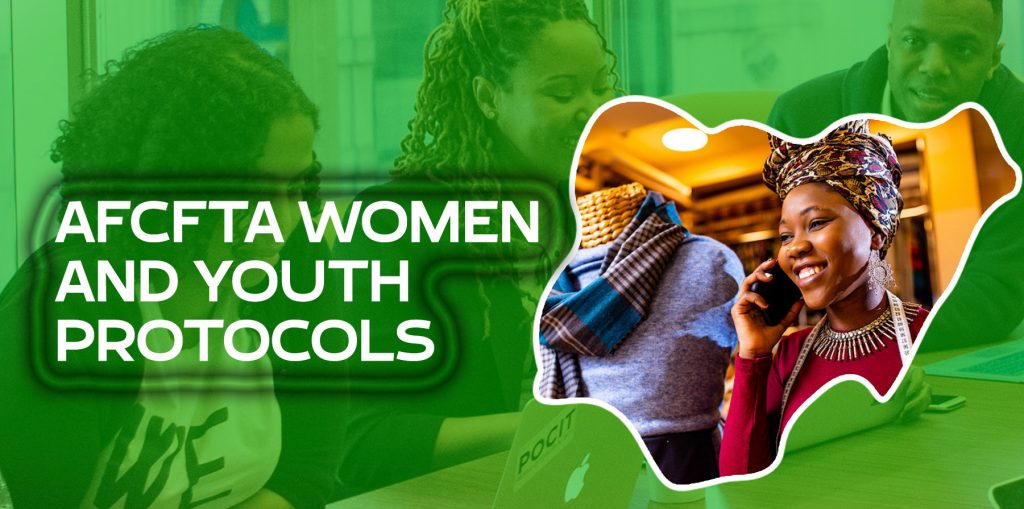The African Continental Free Trade Area (AFCFTA) is one of the flagship projects of Agenda 2063 Africa’s development framework. The AFCFTA aims at accelerating intra-African trade and boosting Africa’s trading position in the global market by strengthening Africa’s common voice and policy space in global trading negotiations.
A Protocol for women and youth will be negotiated and adopted as part of the AFCFTA Agreement. Wamkele Mene, the Secretary-General of AFCFTA, announced at a plenary session on the topic: “Making the AFCFTA work for Africa we want” at the Afreximbank annual general meetings in Cairo, Egypt, that the Protocol is being developed to place both the women and youth at the center of its activities. This is to ensure that both women and youth, have access to and derive benefits from the continental trade agreement.
The AFCFTA recognizes the importance of women and youth in trade in Africa and their essential role in leveraging the full potential of the agreement. The agreement drafts out gender equality as an objective as part of its framework, thereby highlighting the AFCFTA commitment to empowering African women as well as the youth.
AFCFTA AND YOUTH PROTOCOL
Africa is regarded as the youngest continent in the world, with about 70% of its population being below 30. This high number of young people is a huge opportunity for the continent. It also presents both challenges and opportunities for countries such as Nigeria where the unemployment level is close to 40 percent. However, when this population is harnessed, it will increase productivity and provide labor, which may lead to an increase in investment.
The African Union Commission (AUC) and United Nation Development Programs (UNDP’s) Regional Program for Africa seeks to make the AFCFTA work for African youth by supporting mostly youth-led businesses. Through initiatives on the implementation of the AFCFTA, such as the inaugural AFCFTA Future report (2020), the African Youth Month Innovation Challenge, training guide.
Youths are present in all aspects of the economy and society; they are overrepresented in the informal sector and are exposed to associated drawbacks. They are the driving force of technology, creativity, and other fast-growing sectors. Policies and implementation action should therefore account for their distinctive differences among them.
Also, youth-owned/led businesses should be included when connecting African trades across countries. Trade service providers such as transportation, logistics, and travel should consider reducing the rate for young cross-border trades. Institutional arrangements should be put in place to make sure that the young people are properly represented.
AFCFTA AND WOMEN PROTOCOL
More than 70 percent of cross-border traders, especially those that carry out informal trading are women. In Nigeria, recent research shows that women constitute most of the players in the SMEs ecosystem which account for nearly 90 percent of the labor force in the informal sector.
The AFCFTA Protocol will address trade-related issues and challenges in the context of both informal and formal trade in Africa. It will also provide answers to problems faced by women traders in many countries and regions on the continent. Therefore, the AFCFTA is expected to create new trading and entrepreneurial opportunities for women in the economy across different sectors, including agriculture, manufacturing, and services sectors.
The benefits under the Agreement for women and youth are not automatic, and there must be a better understanding of what is required at the national and regional levels to enhance economic opportunities for women. Although trade can serve as a catalyst to promote greater gender equality, it is not gender neutral. Women and men are impacted differently due to differences in economic representations and various social inequalities. It has become apparent that women are less likely to be equipped with the appropriate skills, technology, and resources that would enable them to benefit from trade and trade liberalization.
The Food and Agriculture Organization of the United Nations (FAO) has combined efforts with the International Trade Centre (ITC) SheTrades Initiative to support women in overcoming gender-based obstacles in the context of the African Continental Free Trade Area (AfCFTA). The new joint program will promote women’s readiness to engage in negotiations around the AfCFTA and access to capacity building and higher-productivity activities, capitalizing on the new opportunities in regional trade created by the agreement.
Putting women-owned enterprises in the driving seat of AFCFTA moving them up the value chain and encouraging them to improve will not only activate a dynamic trading regime. It will not also increase competitiveness in the intraregional trade but will also grow volumes and harness the power of Africa to trade more and focus on the emerging commerce opportunities.
In conclusion, AFCFTA is focused on making sure that it works for all entrepreneurs by raising awareness of its various standards and protocols to be implemented. There must also be favorable policies to promote sectors, such as agriculture and manufacturing, that are expected to provide opportunities for both the youth and women entrepreneurs. These measures will encourage and empowers SMEs, particularly women and youth-led enterprises to use the opportunity presented by the AFCFT and begin overcoming the challenges to intra-African trade.
Reference(s)
- “Africa’s youth must drive – and benefit from – the African Continental Free Trade Agreement”. United Nations Development Programme, accessed 30th July 2022.
- “Boosting women’s engagement in trade and promoting inclusive economic development in Africa”. Food and Agriculture Organization of the United Nation, accessed 1st August 2022.
- “The Futures Report: Making the AfCFTA Work for Women and Youth”. African Union, accessed 1st August 2022.
